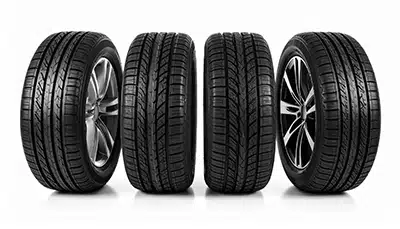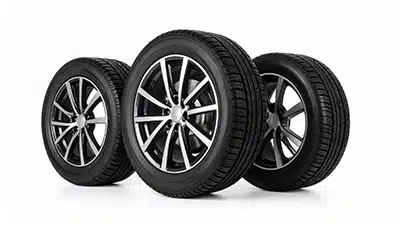Understanding All-Season Tire Technology
All-season tires represent the perfect balance of versatility and performance for most drivers, providing reliable traction across a wide range of conditions without requiring seasonal changeovers. At Custom Wheels N Tires, we understand that for many vehicle owners, convenience and consistent performance matter just as much as specialized capabilities.
Modern all-season tires have evolved significantly from their early iterations, incorporating advanced technologies that deliver impressive performance in dry, wet, and light winter conditions. Let's explore what makes all-season tires the ideal choice for many drivers and how to select the perfect set for your specific needs.
The All-Season Advantage
True Year-Round Versatility
All-season tires are engineered to perform reliably across a broad spectrum of conditions, making them the ideal "one-tire solution" for drivers in moderate climates. Their versatility stems from several key design elements:
- Rubber compounds formulated to remain flexible across a wide temperature range
- Tread patterns that balance dry performance with wet and light snow traction
- Siping designs that provide additional biting edges for variable conditions
- Carefully engineered void ratios that evacuate water while maintaining road contact
This versatility means you can confidently navigate spring rain showers, summer heat, autumn leaves, and even light winter conditions without changing tires—providing convenience and value that specialized seasonal tires cannot match.
Extended Tread Life
All-season tires typically deliver significantly longer tread life compared to performance-focused summer tires or specialized winter options. This longevity stems from:
- Harder rubber compounds designed for slower, more even wear patterns
- Reinforced construction that maintains shape under varied driving conditions
- Tread designs that distribute weight and forces more evenly
- Computer-optimized footprints that minimize irregular wear
Many quality all-season tires now offer 60,000-80,000 mile treadwear warranties, providing excellent value over their lifespan and reducing the frequency of replacements. This extended durability makes them particularly well-suited for daily drivers and family vehicles.
Comfortable, Quiet Performance
All-season tires prioritize ride comfort and noise reduction alongside their versatile performance capabilities:
- Computer-modeled tread patterns minimize harmonic noise generation
- Variable pitch technology disrupts sound wave patterns
- Optimized sidewall construction absorbs road imperfections
- Specialized internal construction reduces vibration transmission
These comfort-enhancing features make all-season tires ideal for vehicles used primarily for commuting, family transportation, and everyday errands where a smooth, quiet ride contributes significantly to driver satisfaction.

All-Season Tire Categories
Standard Touring All-Season
Touring all-season tires represent the most common category, focusing on comfort, longevity, and all-around competence across conditions. These tires are ideal for sedans, minivans, and crossovers used primarily for everyday transportation.
Key characteristics include:
- Symmetrical tread patterns with moderate siping for balanced performance
- Emphasis on low noise levels and ride comfort
- Excellent treadwear ratings, often 70,000+ miles
- Moderate wet performance capabilities
- Fuel-efficient designs with lower rolling resistance
Popular models include the Michelin Defender T+H, Continental TrueContact Tour, and Bridgestone Turanza QuietTrack, all of which deliver exceptional reliability and value for everyday drivers.
Grand Touring All-Season
Grand touring tires step up the performance aspects of the all-season formula while maintaining versatility and reasonable tread life. These tires suit drivers who appreciate more responsive handling without sacrificing year-round capability.
Distinguishing features include:
- More responsive handling characteristics with crisper steering feel
- Enhanced dry and wet grip compared to standard touring options
- Slightly firmer ride quality prioritizing road feedback
- Moderately lower treadwear ratings (typically 50,000-70,000 miles)
- Often fitted to luxury sedans, sports coupes, and premium crossovers
Excellent examples include the Pirelli Cinturato P7 All Season Plus II, Continental PureContact LS, and Bridgestone Turanza QuietTrack, which deliver a more engaging driving experience without significant compromises in comfort or longevity.
Ultra High-Performance All-Season
For enthusiast drivers seeking maximum grip and responsiveness while maintaining year-round usability, Ultra High-Performance (UHP) all-season tires deliver the most dynamic capabilities in the all-season category.
Notable characteristics include:
- Performance-focused tread compounds for enhanced grip
- More aggressive tread patterns with optimized block stability
- Enhanced high-speed stability and cornering capabilities
- Shorter treadwear expectations (typically 40,000-60,000 miles)
- Higher speed ratings (V, W, or Y)
Leading options in this category include the Michelin Pilot Sport All Season 4, Continental ExtremeContact DWS06 Plus, and Goodyear Eagle Exhilarate, which bring performance-tire responsiveness to the all-season segment.
Crossover/SUV All-Season
Specially developed for modern crossovers and SUVs, these all season tires address the unique requirements of heavier vehicles with higher centers of gravity.
Specialized features include:
- Reinforced construction supporting higher load capacities
- Tread compounds balanced for durability and grip
- Enhanced stability characteristics for taller vehicles
- Often available in larger rim diameters (18"-22")
- Sidewall designs complementing crossover/SUV styling
Popular selections include the Bridgestone Dueler H/L Alenza Plus, Continental CrossContact LX25, and Michelin Premier LTX, all engineered specifically for the unique dynamics of modern utility vehicles.

Selecting the Right All-Season Tires
Climate Considerations
While all-season tires offer year-round versatility, their suitability varies depending on your local climate:
- Moderate climates: All-season tires excel in regions with mild winters and moderate temperature variations
- Occasional winter conditions: Modern all-season tires handle light snow and brief cold snaps adequately
- Severe winter regions: Areas with regular heavy snow or prolonged freezing temperatures still benefit from dedicated winter tires
- Predominantly warm climates: Consider summer tires or performance all-seasons that emphasize warm-weather grip
Be realistic about your local conditions—while all-season tires have improved significantly, they cannot match the specialized performance of winter tires in severe conditions or summer tires in high-performance applications.
Driving Style and Priorities
Your personal driving preferences should guide your all-season tire selection:
- Comfort-focused: Standard touring all-seasons prioritize smooth, quiet operation
- Performance-oriented: UHP all-seasons provide more responsive handling
- Economy-minded: Low rolling resistance all-seasons enhance fuel efficiency
- Longevity-focused: Standard touring models with high mileage warranties offer maximum value
Be honest about your driving style and priorities—the "best" all-season tire varies significantly based on what aspects of performance matter most to you.
Key Takeaways: All-Season Tires
- All-season tires provide true year-round versatility for drivers in moderate climates
- Extended tread life (often 60,000-80,000 miles) delivers excellent long-term value
- Comfortable, quiet performance makes all-season tires ideal for daily driving
- Standard touring all-seasons prioritize comfort, quietness, and longevity
- Grand touring options enhance performance while maintaining reasonable tread life
- Ultra High-Performance all-seasons deliver responsive handling with year-round capability
- Specialized crossover/SUV all-seasons address the unique needs of larger vehicles
- Climate considerations should guide your specific all-season tire selection
- Personal driving style and priorities determine which all-season category best suits your needs
Frequently Asked Questions
Can all-season tires really handle snow and ice?
Modern all-season tires perform adequately in light snow and occasional winter conditions but have limitations. They can handle brief winter weather, light snowfall (up to a few inches), and temperatures around freezing. However, they cannot match dedicated winter tires on ice, packed snow, or in sustained temperatures below 25°F (-4°C). Their winter capability comes from specialized siping patterns and compounds that remain somewhat flexible in cold weather, but the compromises necessary for year-round performance mean they'll never equal purpose-built winter tires in severe conditions.
What's the difference between all-season and all-weather tires?
All-weather tires represent a newer category that bridges the gap between traditional all-season and winter tires. The key difference is certification—all-weather tires carry the Three-Peak Mountain Snowflake (3PMSF) symbol, indicating they've passed specific snow traction tests. All-season tires typically don't have this certification. All-weather tires use compounds and tread patterns that perform better in winter conditions while maintaining reasonable performance in warmer months. They're ideal for drivers in variable climates who want enhanced winter capability without seasonal changeovers, though they typically offer shorter tread life than standard all-seasons.
How long should quality all-season tires last?
Premium all-season touring tires typically deliver 60,000-80,000 miles of service under normal driving conditions with proper maintenance. Grand touring models usually offer 50,000-70,000 miles, while Ultra High-Performance all-seasons generally provide 40,000-60,000 miles. Actual longevity depends heavily on driving habits, road conditions, maintenance practices, and vehicle alignment. Regular rotation every 5,000-7,000 miles, maintaining proper inflation, and addressing alignment issues promptly can help you achieve or even exceed the manufacturer's treadwear warranty mileage.
Are more expensive all-season tires worth the premium price?
Premium all-season tires generally justify their higher cost through measurable advantages in performance, longevity, and refinement. Top-tier brands like Michelin, Bridgestone, and Continental typically offer better wet braking, more consistent handling, longer tread life, quieter operation, and enhanced fuel efficiency compared to budget options. The value equation depends on your priorities—if you keep vehicles long-term, drive substantial annual mileage, or value performance and comfort, premium tires often deliver better cost-per-mile and satisfaction. Budget-conscious consumers can find good compromise options in mid-tier brands that incorporate many premium technologies at more accessible price points.
Should I choose the same size all-season tires as my original equipment?
For most drivers, maintaining the original equipment (OE) tire size provides the best balance of performance, reliability, and vehicle system compatibility. The manufacturer's recommended size ensures proper speedometer accuracy, transmission shift points, ABS function, and load-carrying capacity. However, minor modifications—like slightly wider tires or modest changes in aspect ratio—can be acceptable if done knowledgeably. If considering size changes, consult with our tire experts to ensure the overall diameter remains within 3% of the original specification and that width changes won't create clearance issues with suspension components or during steering movements.
At Custom Wheels N Tires, we understand that choosing the right all-season tires involves balancing multiple factors including your vehicle type, driving conditions, performance expectations, and budget. Our tire specialists can help you navigate these considerations to find the perfect all-season solution that delivers the ideal combination of versatility, comfort, and value for your specific needs.